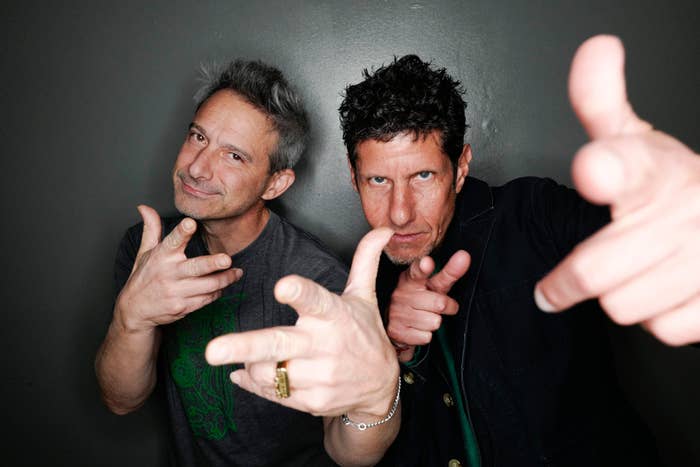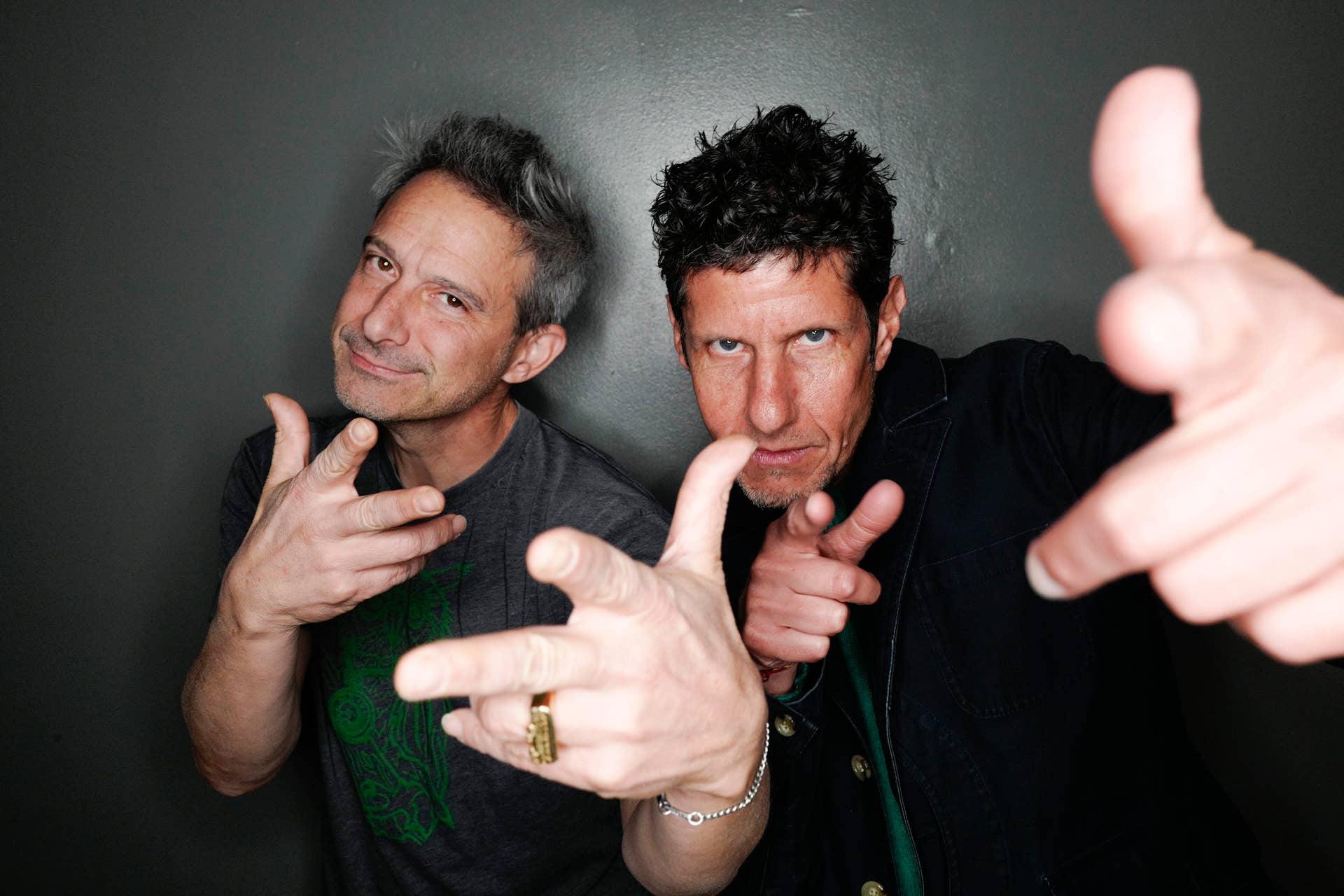
The Beastie Boys' story is amazing—I'm not just referring to Apple TV+'s Beastie Boys Story, the Spike Jonze-directed "live documentary" featuring surviving Beastie Boys members Mike Diamond and Adam Horovitz sharing the story of 40-plus year friendship with Adam Yauch that turned into one of the most iconic bands of all time. That's amazing as well. But the actual story? Going from teens making each other laugh while making punk rock and hip-hop music in New York City to crafting the music of my youth, music that helped push hip-hop into the mainstream (they toured with Madonna, in the '80s!), but truly highlighted the DIY cool that influenced a gang of producers and artists in their shadow? Seeing that unfold in this format, with Adam and Mike cracking jokes, riffing, and (at times) getting pretty fucking deep about how much of a driving force Yauch was for the band and the world at large? Yeah, it's fucking amazing, and worth the watch for those who love the group or need some help understanding their importance.
Beastie Boys Story, which is out now on Apple TV+, dives into all of that and more. If you read Beastie Boys Book, you should have a great idea of how in-depth this documentary is, and if you got to witness the live shows Mike and Adam did in 2019, which Jonze stitched together to craft this "live documentary," you'll know how amazing of an experience this truly is. Recently, I got to chop it up with Mike, Adam, and Spike via Zoom; after discussing the egg sandwich Mike was inhaling after a meeting (and Spike's spiffy white shirt), we chopped it up about the process of putting this live doc together, how the Beastie Boys discovered the internet, and that mid-credits scene we hope you all paid attention to.
After watching the doc and realizing that it was initially a three and a half-hour live show, my first thought was "who had all of that footage and stored away?" Where was all of that stuff sitting?
Mike Diamond: Well, I'd like to say we have a really well-organized archive, everything was meticulously stored, but that is not the case. I think it was funny when Adam and I started—not with the book, but when we first started writing the live show—we actually went back and we're like looking at some of these, just seeing what we get in mining the internet, which obviously is a lot. So there's some stuff that came from... I pulled out boxes and boxes out, Adam pulled out boxes and boxes. We had boxes and stuff at the office. But then there's a lot of stuff that was a big part of the project honestly. Just doing this archive dig of stuff that we don't....we definitely sometimes remember it, sometimes we didn't and being able to do the dig and find... "Does somebody still even have a negative of this?" "Do they even still have this photo or do they still have the original footage?"
Our editors Jeff and Zoe were with us when we were doing the place and if they're in the theater making all those videos and the two of them and Pete, from management, did like, I basically worked on that for months and months pulling all that stuff and they went deep. They pulled up stuff that they found like old public access videos and there's a lot we could just watch it for hours. It was just fun to just put on and like just watch.
It seemed like it got real playful, especially with the seven-minute block of remixed footage that played in the middle of the credits. It's basically like a Marvel mid-credits scene. What was the science behind adding that into an already dense documentary about the whole story.
Spike Jonze: I think it was just that we saw so much footage that we loved as we're editing, so much stuff that we thought was hilarious and we just thought we'd put like this sort of random mixtape thing buried in credits.
What's been the response from the people you guys grew up with back in the day, being able to relive your past and history through a project like this.
Adam Horovitz: My friends haven't seen it yet. My family and friends all saw the show that we did, and our book. A lot of my friends were just really, really liking that it felt like it brought them back to certain times of our lives together. Good times. And it made them happy.
SJ: My friends haven't seen the film yet, but they came through the shows that we did in Brooklyn. It was interesting for the people in New York, it was like it brought back episodes of their own lives. I thought it was interesting when we did the show in L.A. or San Francisco or London; it's kind of like different parts of our story resonated with people in different cities depending on where they started. New York was definitely a lot of people who started off earlier. In L.A., it was a lot of people who started with Check Your Head and that was their take-off point.
Guys like Russell Simmons and Rick Rubin are referenced a lot in the show. Did they have any idea what was coming with the doc?
MD: Russell, I don't know. Rick, we talked to about it.
AH: Rick saw the show.
MD: Yeah. Rick saw the show and a cut of the documentary. Rick and I had a discussion. The story he would tell would be pretty different than our story, and I think fair enough. Hopefully he does that on his podcast or his show or whatever. We even talked about maybe all of us doing the discussion together. There's that moment in time where Rick was a really big part of it and that's what we were trying to get across in the show where we were at Rick's dorm every day. We were all living this life together.
For me, the stories in the doc made me remember how I consumed music back in the day. I was big into MTV, it was always on. I remember, my middle school dances "Sabotage" would come on, it would be pandemonium in the activity center we were in. So I'm wondering, for you guys, were there any particular parts of your past that you really got reconnected while going through this process of going through your past?
AH: I really liked the phrase "pandemonium in the activity center."
It's facts, it's facts.
AH: It's weird going back on your own life and trying to write it all down. There's tons of times that were really great times, and some times that were not so great. Sometimes it's sucked. The best part of the through line for us is that there was the three of us that had been friends throughout the whole thing.
What was the process like in cutting down a three and a half-hour live show into a two-hour story? Were there parts where you guys felt that if you could go back and do it again, you would do things different or include things that had to get cut?
AH: I mean we would have talked to other directors, maybe, about what's important.
SJ: Well, I mean I was not your first choice. I was really the only one available.
MD: Seventh!
SJ: Now, cutting it down, there was a lot of stuff that felt like it worked well in the show on stage but then it didn't translate as well. I think also as we went from three and a half hours, we intentionally shot it long and every night was different, they'd improvise a lot. Since we only did four shows, we let it go knowing we could take different pieces from different nights. But also we did hone it down to be tighter in the story and not as many tangents.
MD: There was a funny process too; there was a night where first we did the trio, which was right after the book came out, then we spent months rewriting them and working with Spike and everyone else. Then we started working on the show in Philadelphia and we did our show there and that was still really rough. Then we went to Brooklyn, and even the first few nights in Brooklyn were pretty rough and went pretty long. We all met up back in the theater early the next morning after being up late the night before and we'd be like, "All right, what do cut? We got to cut things, this dragged, this felt a little to slow", and then that night it was like playing a show where it felt like a victory, like "all right, now it actually clicks. This will actually work, we got to believe it, finally! Now we have the master take."
I remember like the night after that, we had freedom to riff and go for it a little more because we knew we had the master take, so it was like making a record that way. But then at the same time, it's funny; we thought that we already had that with master take and that's what we had made, but what the film ended up being was completely different than that, then you think, "how much of that master take is even in it?"
I noticed that there were definitely times where it felt like you guys would just you mentioned improvisation, riffing a little bit. How did you factor that into the bulk of the show? It looked like on the prompters there are whole stanzas worth of text. Are you making sure that you can just freestyle stuff around here, or was that just coming naturally between you two?
AH: Look, we were doing the best we could. Okay? We wrote a thing, we tried out our best. It's not really what we do. We had a plan; we did have an idea, more than an idea, and we had a script. Mike and myself... we're limited in certain ways; reading, memory; there's certain things like that we don't excel at.
MD: Yeah. Cognition, certain basic skills we lack.
You say that but you remember a shitload more people than I ever could. To pinpoint dates and times and all that stuff; there's something there!
AH: The internet. The gift and the curse about the internet is [that] there's so many obsessive people about everything.
Are you having to go through Beastie Boys fan sites to pick up a lot of that stuff, you're saying?
AH: Oh yeah! There's a website called BeastieMania that's been around for a long time.
MD: It's true. I remember how many times Adam and I were talking about, "Remember this show? Was it this city, or this city?" It is an interesting thing when the internet knows more than you do.
That's interesting because, while I was thinking watching it, I figure there are probably people that could tell the story, but I feel like this is the best way to do it, you two up there, I don't think anybody can really capture your lives other than you, but I think in the way that it was told, being able to break down the influences of what was going on in New York. The beginning is very; it's so New York City and I feel like it's hard for anybody else to really capture that. So it's a blessing that you have these amazingly obsessive resources that help you guys put it into that proper context.
MD: You're right. You're 100% right on that. It's funny, I remember a story and it's in the book, not in the film at all, but this guy, Ian Rogers, who went on to become a friend of someone who worked with us and become a friend of ours, he literally built the first Beastie Boys fan site that we knew of. We were on tour at Lollapalooza, and he came to Indiana or Indianapolis or something. He's backstage and he's trying to hook up a black and white laptop to a dial-up connection, and he basically showed us the internet and showed us what he had built. It was the first fan site that had fans. Thank God, I guess, for those people.
Beastie Boys Story is streaming now on Apple TV+.



